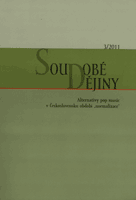Skupina Nahoru po schodišti dolů band a státní moc. Příspěvek k dějinám neofi ciální hudební scény 80. let
The Nahoru po schodišti dolů band and the Powers That Be: An Essay on the History of the Unsanctioned Music Scene in the 1980s
Author(s): Jan BártaSubject(s): Music
Published by: AV ČR - Akademie věd České republiky - Ústav pro soudobé dějiny
Summary/Abstract: The author discusses the Nahoru po schodišti dolů band (The Up the Down Staircase Band) as one of the groups representing the special music and social phenomenon called New Wave, which appeared in Communist Czechoslovakia in the early 1980s. He first describes the phenomenon generally, placing it in the social and cultural context of the times, and then defines the ‘Czech New Wave’, which, despite its ambiguity, he understands as a generation of original music groups with clear social features in the first half of the 1980s. He also points out the influences of this music trend, its intellectual essence, the distinctive use of Czech in its lyrics, and also the range of styles of the groups that claimed to be part of the Czech New Wave. Among the characteristic features of their works, the author mentions the use of humour, irony, and sarcasm, which were supported by the eccentric appearance of their shows. The author also points out the clash between Punk and New Wave on the one hand and sanctioned arts policy and the state institutions in charge of implementing it on the other, which saw both Punk and New Wave as a form of ‘ideological deviation’. He also emphasizes, however, the utterly apolitical character of both trends. This régime interpretation is illustrated in particular with the infamous article ‘Nová vlna se starým obsahem’ (A New Wave with Old Content), published in the ideological weekly Tribuna in March 1983, and then with a description of the bureaucratic mechanisms that sought to get rid of nonconformist music groups, in particular the cancelation of agreements to perform under a certain patron. The second part of the article considers the story of the Nahoru po schodišti dolů band, which was founded in 1983, illustrating their genre with examples of their lyrics. The group’s career was considerably influenced by their concert in the Za Větrem restaurant, Prague, in June 1984, which ended with a police raid. Using secret-police documents together with oral testimony by members of the group, the author reconstructs the event and the police investigation and the bans on giving concerts, which followed it. Despite the bans on performing in certain parts of Prague and the repeated cancellation of agreements to perform after the secret-police intervention, however, the group, rather than disband, again carried on in the late 1980s. From this case, the author draws conclusions about the effectiveness of ideologically motivated restrictions on pop music in the context of nascent Czechoslovak perestroika in the middle of the decade.
Journal: Soudobé Dějiny
- Issue Year: XVIII/2011
- Issue No: 03
- Page Range: 383-413
- Page Count: 31
- Language: Czech

